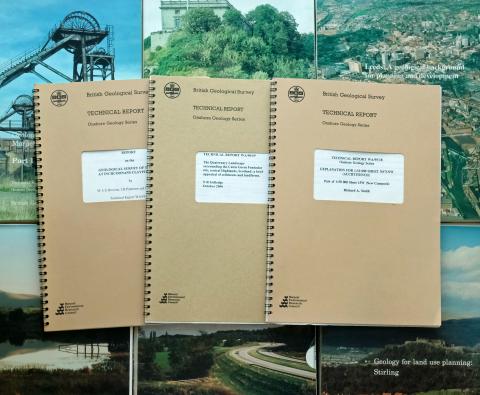The need for climate change mitigation and greater resilience to its impacts is driving demand to decarbonise energy, transport and industry across the globe. Knowledge of the subsurface has a crucial role in providing solutions that will support our transition to net zero. The release of over 8000 technical reports by the National Geoscience Data Centre (NGDC) through the British Geological Survey’s publication viewer means that a significant treasure trove of knowledge about the subsurface is now more widely accessible to support such solutions.

BGS Technical Reports – Credit BGS/UKRI
The National Geoscience Data Centre (NGDC) is the designated repository for the technical reports archive created by the British Geological Survey between the 1950s and 2000s. The collection, comprising 16 series of unpublished technical works, covers the full spectrum of BGS activities and subjects, including:
- onshore geology
- marine geology
- minerology and petrology
- mineral resources
- global seismology
- geomagnetism
The wealth of knowledge within these reports has largely, until now, only been accessible within BGS, as few were deposited with libraries, making them hard to find and access. Ensuring the integrity of the collection, e.g. through standardisation, has in the past, prevented their release, while due to the legacy nature of the collection, some reports had been scanned multiple times and certain scans had not been correctly linked to corresponding metadata records. Remedying these errors would necessarily require manual intervention and would have delayed release of the dataset.
To make the data management task tractable and to fulfil NGDC’s commitment to ensure data are open and Findable, Accessible, Interoperable and Reusable (FAIR) for all, a decision was taken to release the non-confidential technical reports without a full Quality Assurance (QA) check on each scan. Procedures were put in place to automate the matching of the scans to their metadata and routine file management techniques were used to improve the quality of the matching. The PDF files were de-duplicated, and where it was known that a report had already been checked and confirmed to be complete, any additional scans were deleted.
With careful and pragmatic data management, the NGDC has been able to ensure these reports are now accessible to the wider public. Following this renewed focus by the NGDC data stewardship team in the past year, the activity to review the reports, harmonise scanned copies and improve the metadata records has resulted in the release of over 8000 non-confidential technical reports in June 2024 on the new BGS publications viewer.
The next stage of the project will be to conduct a confidentiality review of the remaining technical reports with a view to a future release. A task to run Optical Character Recognition (OCR) software on the report scans is also currently underway to allow full text searching which would further enhance findability of the data and knowledge held within these scans.
The BGS Publications Viewer – Credit BGS/UKRI
By opening up this collection externally, NGDC has improved accessibility of the technical reports so that they can more easily be used by stakeholders. Following the announcement of the release, there has been positive feedback from the public, with one LinkedIn user stating the collection looks like a ‘veritable treasure trove!’.
The reports can be searched by authors, title or report reference, and scanned reports are available as PDF downloads. More detailed notes on this complex set of reports are available on Earthwise.
The release of these reports demonstrates BGS’s continued commitment to providing open access to geoscience data of value to the nation. These reports, created by BGS during the latter half of the past century and now all in digital form, contain a wealth of geological information and knowledge that is now easier to access and utilise.
-Alison Steven, data operations and governance manager (NGDC)
References
British Geological Survey (2024) Publications Viewer [website] Accessed June 2024 https://webapps.bgs.ac.uk/data/publications/
BGS Earthwise, British Geological Survey reports – their characteristics and history [website] Accessed June 2024 https://earthwise.bgs.ac.uk/index.php/British_Geological_Survey_reports_%E2%80%93_their_characteristics_and_history